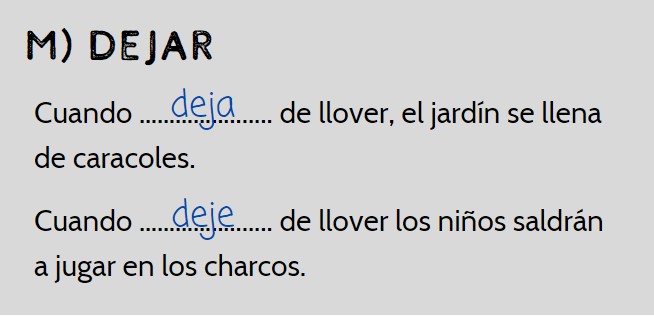6 Adverbial Clauses: Subjunctive & Indicative
 Indicative vs
Indicative vs  Subjunctive in Adverbial Clauses
Subjunctive in Adverbial Clauses
When we relate two events or ideas in time, we can use both the indicative and the subjunctive in an adverbial clause. We relate two events in time be using words like:
| cuando | when |
| en cuanto / tan pronto como | as soon as |
| hasta que | until |
| mientras | while / as long as |
| siempre que | whenever |
We use the indicative when the event of the adverbial clause happens before or at the same time as the event of the main clause. We use the subjunctive when the event of the adverbial clause happens in the future with relation to the event of the main clause. Enlarge the following image and study the examples.
EJERCICIO 6.1
Decidí se las frases en negrita se refieren a un evento pasado, habitual o futuro.
EJERCICIO 6.2
Completá cada par de oraciones con la forma adecuada del verbo en indicativo o subjuntivo según el contexto. Seguí el modelo:

Some expressions always trigger the subjunctive in adverbial phrases because they can only refer to a future action in relation to the time of the main clause.
| a fin de que / para que / por que* | in order to / so that |
| con tal (de) que | provided (that) |
| no sea que / no fuera que | as long as, just in case |
| antes (de) que | before |
| a menos que / a no ser que | unless |
| en caso (de) que | just in case, in the event that |
| sin que | without |
| *Note that por que is different from porque (because), por qué (why) and el porque (the motive). This is mainly heard in Spain and is not common in Latin America. “Yo me muero por que me vean contigo y tú te mueres si te ven conmigo.” “I die to be seen with you and you die if you’re seen with me.” —El crimen ferpecto – película española |
|
EJERCICIO 6.3
Conditional Adverbial Clauses
With the adverb si (if) we can either use the indicative or the imperfect subjunctive.
Use the indicative to express a condition as plausible.
- Si tenés ganas, vamos a comer en el nuevo restaurante japonés este finde.
If you’re up for it, let’s go eat at the new Japanese restaurant this weekend.
Use the imperfect subjunctive (never the present subjunctive) to express a condition that is either unlikely or contrary-to-fact.
- Si ganáramos la lotería, podríamos comprar esa casota que vimos en aquel barrio de ricachones. (unlikely condition)
If we were to win the lottery, we could buy that huge house we saw in that rich-person neighborhood. -
Si no estuviéras trabajando hoy, podríamos ir a la playa. (contrary-to-fact condition)
If you weren’t working today, we could go to the beach.
EJERCICIO 6.4
Como si + imperfect subjunctive
The adverbial expression como si (as if) always triggers the imperfect subjunctive because it introduces a contrary-to-fact situation as a metaphor to describe what’s actually happening.
- ¡Hablás como si estuvieras en pedo!
You’re speaking as if you were drunk.
EJERCICIO 6.5

